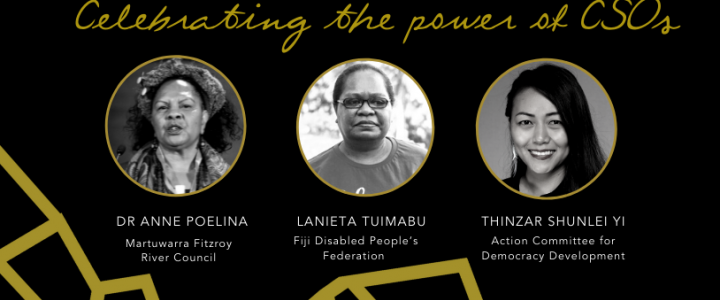Brace yourselves for an inspiring journey with our Opening Keynote Session speakers.
Three incredible women, each with a very different, yet moving story, are doing seemingly unrelated work. However, underlying their stories is a clear message that binds them together: Civil Society Organisations (CSOs) are influential, and they are crucial to social cohesion. These three women are Anne Poelina from Western Australia, Lanieta Tuimabu from Fiji and Thinzar Shunlei Yi from Myanmar, who, for ACFID Conference’s Opening Session, will come together as we celebrate the power of CSOs.
Our first remarkable speaker will be Anne Poelina, who will discuss Climate Change, Sustainable Development and Water Security in relation to Indigenous ecological knowledge and self-determination.
Anne is a Yimardoowarra marnin: an Indigenous woman from the Mardoowarra, Fitzroy River and a Nyikina Warrwa Traditional Owner. Summarising Anne’s work and achievements is no easy feat!
She is a highly qualified academic with three Master degrees, a PhD and two undergraduate awards, in a range of disciplines from Education and Public Health to Tropical Medicine and Indigenous Social Policy. She is armed with a diverse set of lenses through which she studies Aboriginal and Torres Strait Islander health and wellbeing, which give her uniquely interdisciplinary expertise.
Her PhD thesis, Action Research to Build the Capacity of Nyikina Indigenous Australians, studies the importance of heritage and language to Nyikina people’s social, cultural and economic wellbeing. For over 28 years, she has been a research consultant and research fellow for various universities and is currently Adjunct Senior Research Fellow both at the University of Notre Dame and Charles Darwin University.
In addition to her academic work, Anne is also a powerful public speaker, active Indigenous community leader, human and earth rights advocate, and filmmaker. Across all her work, her message is clear: Indigenous science, law, knowledge and wisdom has not been rendered irrelevant by time. If anything, there is an urgent need now, more than ever, to integrate Indigenous knowledge systems into our dominant ones, and bring Indigenous perspectives to the forefront of decision making. Her current work focuses on building culture and conservation economies on Country.
Through the Martuwarra Fitzroy River Council, Anne helps to protect and care for the Martuwarra as a living Ancestral being. This CSO brings together the majority of Traditional Owner groups from the region. Together, the Voices of the Martuwarra work to protect the River from invasive threats of existing and proposed developments. The Council’s conservation efforts are based on the River’s Right To Life. It is both sacred and National Heritage Listed, and is integral to the river systems that make up, as the Council describes, the “lifeblood of our Nation”.
Following Anne, Lanieta Tuimabu of the Fiji Disabled People’s Federation (FDPF) will speak on The COVID response in the Pacific. The current situation in the region has caused a pivot of local organisations to address the immediate needs of the community. Lanieta will focus specifically on the response of organisations of persons with disabilities.
Lanieta is a widely recognised advocate and leader for all people with disabilities, ensuring their full inclusion across society both within Fiji and globally. Lanieta became blind at the age of 10, and since the age of 16 has poured her energy into the disability movement. She now holds many senior leadership roles and has received awards in honour of her enduring efforts. These include roles in United Blind Persons of Fiji and Fiji Disabled Peoples Federation Youth Committee, and she has served on the Board and the Women’s Committee of the Pacific Disability Forum. Lanieta recently received the 2021 Women in Leadership Award as part of the National Disability Awards in Fiji.
In conjunction with her disability work, Lanieta is also an advocate for women’s rights, having served on a Board Trustee of the Fiji Women’s Crisis Center, and is currently part of the Fiji Ministry of Women Children and Poverty Alleviation Endling Violence Against Women task force. As an active member of the Shifting the Power Coalition, she works to strengthen the collective power and leadership of Pacific women in disaster planning and response. We absolutely can’t wait for Lanieta to share her invaluable perspectives and insights with our attendees.
Closing the session will be Thinzar Shunlei Yi, Advocacy Coordinator at Action Committee for Democracy Development (ACDD), who will be joining us from a safe location in Myanmar. Thinzar will speak on the topic of Closing Civic Space/Democracy in reference to the current situation in Myanmar and ongoing civil society response to the February coup. Thinzar embodies a voice of stoic clarity, that has somehow refused adulteration by social and political pressure, even in the face of great danger.
Thinzar is Myanmar’s most prominent youth activist, whose work focuses on youth development and dialogue. She is the coordinator of Burma’s National Youth Congress and the Yangon Youth Network. Does the #myfriend campaign sound familiar? Thinzar is the founder of this diversity campaign. It has gained significant global media attention as it radically brought together youth of different ethnic and religious backgrounds, to combat intolerance and extremism in Myanmar. She is an active member of the first-ever Ambassador’s Youth Council at U.S. Embassy Rangoon, which meets monthly to advise the Ambassador on youth perspectives and needs in Burma.
Her work with ACDD aims to support and strengthen the capacity of democracy and human rights activists. This committee, made up of 12 grassroot networks, represents workers, ethnic groups, youth and farmers. The committee supports civil society as key change agents, by cooperating on rights-based actions and campaigns.
Without a doubt, this Opening Session, full of incredibly impressive, articulate and inspirational women, is not to be missed. Through their varied work in Civil Society Organisations, Anne Poelina, Lanieta Tuimabu and Thinzar Shunlei Yi have made significant impacts in their respective fields of work. All three will join together on virtual stage for a facilitated discussion regarding how they believe INGOs and donors should provide support, including what is needed to ensure the transition of power and resources to local organisations. We are so honoured and excited to have them as our opening speakers.
You don’t want to miss this. Grab your ticket to Conference now!

Gabriella Pirintji
Gabriella Pirintji has joined ACFID as the Membership Support Officer. Gabi comes to us after completing her Bachelor of Development Studies from the Australian National University.









